Some of the best short stories I read in the second half of 2024 included circus mammas, love, grief and philosophy, and a prickly character called Pearl who curls into an armchair ‘like cream’. I hope you lap them up!
‘The Mothers and The Girls’ by Saba Sams
In Send Nudes Saba Sams immerses us in the contradictions and complexities of girls and young women – revealing their vulnerability, power, intensity, desires, fickleness and confusion. From Sams’ fabulous debut collection, ‘Blue 4eva’ won the 2022 BBC National Short Story Award, and it is riveting. I also really liked ‘The Mothers and The Girls’ in which the mothers are talented trapeze artists, and the girls enjoy the freedom of being feral carnival kids running wild during festival season.
‘The audience became eerily quiet as the mothers flew through the nothing air like used tissues in their white silk dresses, arms thrown out as wings might be. Their bodies traced a perfect X against the ceiling of the tent. At the very last moment, they caught hold of the opposite bar and found safety. The crowd gasped. The girls turned and looked at River. He appeared breathless, slightly giddy.
‘Incredible, he said, just magic.’
‘Fortress’ by Elizabeth Woollett
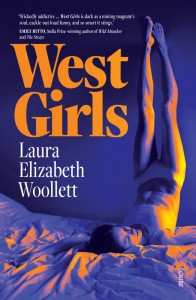 I was floored by ‘Fortress’ from Laura Elizabeth Woollett’s West Girls, one in a series of cleverly interconnected short stories that probe how beauty can be diverting, powerful and costly. Insecurity, uncertainty, racial ambiguity, self-obsession, fat shaming and misogyny swirl in the sea in which the West Girls (Western Australian girls and women) swim. Sometimes, their desires drive them in deep where they’re able to hurt each other ‘in far more inventive ways than men hurt us’. What’s so spine-tingling about ‘Fortress’ is that the hurt extends to someone young and innocent, and the impact of Ciara and Luna’s liaison hits home brutally.
I was floored by ‘Fortress’ from Laura Elizabeth Woollett’s West Girls, one in a series of cleverly interconnected short stories that probe how beauty can be diverting, powerful and costly. Insecurity, uncertainty, racial ambiguity, self-obsession, fat shaming and misogyny swirl in the sea in which the West Girls (Western Australian girls and women) swim. Sometimes, their desires drive them in deep where they’re able to hurt each other ‘in far more inventive ways than men hurt us’. What’s so spine-tingling about ‘Fortress’ is that the hurt extends to someone young and innocent, and the impact of Ciara and Luna’s liaison hits home brutally.
‘Under the spray, she’s slick as a fish, eyelashes wet, bikini dangling off the tap, circles of sand at her feet. So dazed and female, I just … do it. Press her against the daisy tiles and do everything, until the water runs cold, we’ve both got goosebumps, my knees are bruised.’
‘The Sewing Room’ by Mary Costello
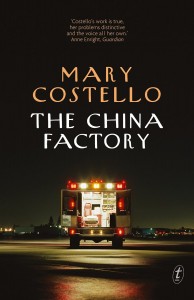 The China Factory is a truly fine collection of short stories and ‘The Sewing Room’ is one of its 12 treasures. Mary Costello’s writing is said to have a similar heft to the marvellous John McGahern and William Trevor and I agree with this assessment. Alice is a schoolteacher who is retiring. She has also found great joy in designing clothes – and we can imagine her spending more time in her sewing room diverting herself from the harsh consequences of what was a single act of youthful passion. The grief, the guilt, the longing are all still in the ether decades later and we feel the sadness and the stoicism that has kept her together.
The China Factory is a truly fine collection of short stories and ‘The Sewing Room’ is one of its 12 treasures. Mary Costello’s writing is said to have a similar heft to the marvellous John McGahern and William Trevor and I agree with this assessment. Alice is a schoolteacher who is retiring. She has also found great joy in designing clothes – and we can imagine her spending more time in her sewing room diverting herself from the harsh consequences of what was a single act of youthful passion. The grief, the guilt, the longing are all still in the ether decades later and we feel the sadness and the stoicism that has kept her together.
‘She thinks of her life, her whole existence, as a catastrophe. She drops her arm and the bag slides off and she thinks how everything has sprung from one moment, one deed – the insane beauty and shock of the flesh, the fire of the soul – with consequences that flowed out and touched and ruptured every minute and hour and day of her life ever since. …
‘Was it all fated, she wonders? Was the desire fated? And the shame? And the crime – was the crime fated, too?’
‘The Choc-Ice Woman’ by Mary Costello
 This story, from Mary Costello’s collection Barcelona, is painful and achingly beautiful – with damage, a begrudging acceptance of life’s letdowns and the consolation of reading woven seamlessly through its pages. Frances’ older brother has died and Frances is in a hearse with the undertaker and the body of her brother, the latter in the very back, behind her head. We soon learn that Frances has seen how men get to choose, and women get to care. Her husband is not what he seemed at first glance, and his behaviour has had a profound effect on her fulfilling her heart’s desire. And yet he is also peaceable, demands little and she has loved him. The complexity Costello navigates in telling this moving story about families, love and marriage make this a must read.
This story, from Mary Costello’s collection Barcelona, is painful and achingly beautiful – with damage, a begrudging acceptance of life’s letdowns and the consolation of reading woven seamlessly through its pages. Frances’ older brother has died and Frances is in a hearse with the undertaker and the body of her brother, the latter in the very back, behind her head. We soon learn that Frances has seen how men get to choose, and women get to care. Her husband is not what he seemed at first glance, and his behaviour has had a profound effect on her fulfilling her heart’s desire. And yet he is also peaceable, demands little and she has loved him. The complexity Costello navigates in telling this moving story about families, love and marriage make this a must read.
‘When she first read the story, Frances had kept waiting for the child to be born to Tonka, but it was never mentioned. She found herself constantly thinking about the story, slipping into the pallid, shadowy realm that the protagonist inhabited. In that kind of daydreaming state, she experienced a floating sense of calm. It was not that she was briefly happy or more content, but that she existed at a deeper level than in her daily waking life.’
‘The Wolves’ by Josephine Rowe
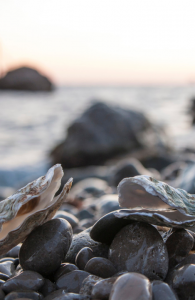 Australian genius of the short story, Josephine Rowe, says ‘I’m just trying for a sentence that will carry the most essential impression, the greatest felt sense of place and character and weather and momentum in as distilled, organic a form as possible.’ This explains, at least in part, why so many of her sentences are absolute gems and why ‘The Wolves’ is such a great story – crackling with energy, urgency and perspicacity.
Australian genius of the short story, Josephine Rowe, says ‘I’m just trying for a sentence that will carry the most essential impression, the greatest felt sense of place and character and weather and momentum in as distilled, organic a form as possible.’ This explains, at least in part, why so many of her sentences are absolute gems and why ‘The Wolves’ is such a great story – crackling with energy, urgency and perspicacity.
‘How was it? We grew up inside those crumbling estate houses, where kikuyu grass knuckled through indifferent brickwork, through the husks of cars, and still we shot up like miraculous gymnosperms to various kinds of fame. Something in that dreadful water, maybe. The mercury content, we joked. Helped us rise. I don’t know. Only that there was a high concentration – what could be considered a disproportionate tendency – towards brilliance, at bewildering odds with circumstance and resource. …
‘Roli is our brightest, our Dog Star. Those junkyard bricolages he just gave away in the ’90s appreciated sufficiently to pay our rents and student loans as the century rolled over and his name caught the light.’
And another quote for good measure …
‘Her name is Pearl but I first hear it, in Roli’s introduction, as Pearlmeat – Pearlmeat Alex – and this is the name she keeps, at least in my thoughts, because this is her scent as I come to know it: a mild, mineral-aquatic sweetness, resting right in the middle of the palate. Pleasant for now, delectable even, but one wouldn’t hazard to leave her in the sun too long, lest she spoil. An agreeable climate then, this. A midsummer day barely grazing 20°C.’
‘Ghosts and Empties’ by Lauren Groff
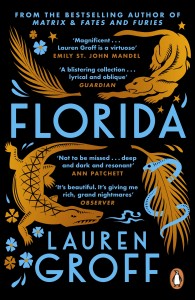 The Guardian review nailed it when it said Lauren Groff’s latest story collection Florida is a portrait not so much of a place as of a particular kind of feeling about a place, as experienced by a series of characters, some of whom seem to be the same woman who is furious beyond measure.
The Guardian review nailed it when it said Lauren Groff’s latest story collection Florida is a portrait not so much of a place as of a particular kind of feeling about a place, as experienced by a series of characters, some of whom seem to be the same woman who is furious beyond measure.
‘I have somehow become a woman who yells,’ says the woman in ‘Ghosts and Empties’ the first story in the collection. And why wouldn’t she scream given ‘the disaster of the world, the glaciers dying like living creatures, the great Pacific trash gyre, the hundreds of unrecorded deaths of species, millennia snuffed out as if they were not precious’? The woman also has sons, and feels the immense pressure of being a mother, wife and woman in a sexist society. She sees other mothers ‘in glimpses, bent like shepherdess crooks, scanning the floor for tiny Legos or half-chewed grapes or the people they once were slumped in the corners’.
‘Yport’ is the collection’s final story. It is set in France, where the woman has taken her children to escape the Florida summer which she describes as ‘a slow hot drowning’. As Groff drives home the climate emergency, it is sobering.
‘She can’t stop the thought that children born now will be the last generation of humans. Her sons have known only luck so far, though suffering will surely come for them. She feels it nearing. The midnight of humanity. Their world is so full of beauty, the last terrible flash of beauty before the long darkness.
‘Refusing the pleasure of a dusk like tonight’s with its cool wind, its sunset, its ocean carousel, its ice cream, strikes her profoundly as immoral.’
‘Espalier’ by Kerry Greer
 ‘On the morning of September 8, 2017, my husband Gabriel ended his own life by multiple means after a long struggle with chronic headaches. He was 32, and I was 29.’ So begins the Preface to Kerry Greer’s debut poetry collection, The Sea Chest.
‘On the morning of September 8, 2017, my husband Gabriel ended his own life by multiple means after a long struggle with chronic headaches. He was 32, and I was 29.’ So begins the Preface to Kerry Greer’s debut poetry collection, The Sea Chest.
I knew about Greer’s terrible loss when I read her short story ‘Espalier’ in which the shadow of past love and ruptured relationships seeps into the life of a widow and solo parent who is pursued by a man who is secretive about his separation from his wife and children. Greer writes beautifully and with great acuity and power – and I was glad to see that ‘Espalier’ was shortlisted for the ABR Elizabeth Jolley Short Story Prize in 2024. Here are a few of my favourite lines:
‘I don’t know who I miss when you fail to call: you, or the one I loved before. Every absence seems tied by rope, hand-over-hand, to that first loss.’
‘I’m thinking of grief, the weight of longing for a person I will never reach, bent double around a memory like a hook.’
‘It might be the only thing we really share, much greater than our love: this urge to build a life across a gap, to carve a home around the silhouette of the past, vast and unknowable.’
‘The Pole’ by J. M. Coetzee
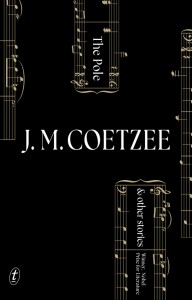 Love, destiny and philosophy are at the heart of J. M. Coetzee’s recent book The Pole and Other Stories. Four of the stories feature Elizabeth Costello, who was the subject of a Coetzee novel called Elizabeth Costello published in 2003. The first piece in the collection is a novella called ‘The Pole’ in which Witold, a 72-year-old Polish pianist and noted but retiring Chopin interpreter, persists with a courtship of sorts with the intrigued but somewhat resistant Beatriz who is a local music devotee.
Love, destiny and philosophy are at the heart of J. M. Coetzee’s recent book The Pole and Other Stories. Four of the stories feature Elizabeth Costello, who was the subject of a Coetzee novel called Elizabeth Costello published in 2003. The first piece in the collection is a novella called ‘The Pole’ in which Witold, a 72-year-old Polish pianist and noted but retiring Chopin interpreter, persists with a courtship of sorts with the intrigued but somewhat resistant Beatriz who is a local music devotee.
Two questions intrigue:
‘Where do they come from, the tall Polish pianist and the elegant woman with the gliding walk, the banker’s wife who occupies her days in good works? All year they have been knocking at the door, wanting to be let in or else dismissed and laid to rest. Now, at last, has their time come?’
‘At what moment did she, Beatriz, the woman whose job it was to take the visiting soloist out to dinner that fatal evening in 2015, become his destined one? What was it about her that brought about her election? Where was the divine in her, that evening? And where is the divine in her now?’
PS: While ‘The Pole’ may well qualify to be called a novella, I’m treating it as a long short story for the purposes of this post. If you don’t agree with its inclusion here, take a look at one of the Elizabeth Costello stories, ‘The Glass Abattoir’, ‘The Old Woman and the Cats’, ‘Hope’, ‘As a Woman Grows Older’ – they broach ageing and end of life issues, and all are excellent of course.
‘Lucy (1950)’ by Fiona McFarlane
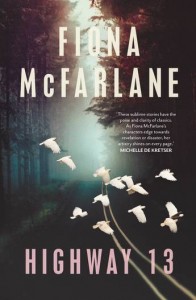 Highway 13 revolves tangentially around serial killing in its 12 short stories. However, there’s little to no gore or police work featured because it’s not the murders or murderer that Fiona McFarlane is most interested in but rather the ripple effect of the murderer’s brutality. How one man’s actions can intersect with the lives of ordinary people in little and large ways and, in some cases, profoundly change their life trajectories. The book also explores people’s fascination with true crime and, particularly, the crimes of one of Australia’s most notorious criminals. In Highway 13, McFarlane names her fictional killer – who kidnaps backpackers and other travellers, kills them, and then takes them into the Barrow State Forest to dispose of their bodies – Paul Biga.
Highway 13 revolves tangentially around serial killing in its 12 short stories. However, there’s little to no gore or police work featured because it’s not the murders or murderer that Fiona McFarlane is most interested in but rather the ripple effect of the murderer’s brutality. How one man’s actions can intersect with the lives of ordinary people in little and large ways and, in some cases, profoundly change their life trajectories. The book also explores people’s fascination with true crime and, particularly, the crimes of one of Australia’s most notorious criminals. In Highway 13, McFarlane names her fictional killer – who kidnaps backpackers and other travellers, kills them, and then takes them into the Barrow State Forest to dispose of their bodies – Paul Biga.
Lucy (1950)’ is the last story in the collection, and it is poised and profound. It works backwards, so that by the end of it we know the exact moment Paul Biga’s mother-to-be decides to leave the family home with Paul’s father-to-be and the wheel of fate for everyone in the book (including all of the people killed by Biga) is set in motion and can’t be stopped.
‘Lucy feels a hilarious pleasure in having given herself up, just this once, to chance; it might be the only accident of her narrow, decided life. Later, however, she’ll come to think of her whole life as an exercise in chance, and she the victim of many accidents: the accident of those parents, of that uncle, of those brothers, of that husband and that son.’
‘Anne of Cleaves’ by Brandon Taylor
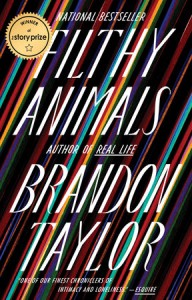 Brandon Taylor wrote the first draft of ‘Anne of Cleaves’ in two hours. ‘It really came all on one wave,’ he told The Rumpus. ‘The whole thing just descended into my mind totally intact.’ ‘Anne of Cleaves’ is a love story. It is also funny, whimsical, insightful and telling, and it’s from Taylor’s first collection of short stories Filthy Animals.
Brandon Taylor wrote the first draft of ‘Anne of Cleaves’ in two hours. ‘It really came all on one wave,’ he told The Rumpus. ‘The whole thing just descended into my mind totally intact.’ ‘Anne of Cleaves’ is a love story. It is also funny, whimsical, insightful and telling, and it’s from Taylor’s first collection of short stories Filthy Animals.
As Marta takes the first tentative steps with her newfound sexuality, and finding her feet with her lover Sigrid, we see her encountering space to be ‘her own person in her own way’, ‘crying the moment Sigrid kissed her’ and dealing with her ex-partner Peter’s homophobia. On the flipside, a certain look Sigrid gives Marta makes her angry because she feels she is being treated ‘like some kind of unwashed beast that needed a long leash and a slow walk’.
Here are a couple more quotes …
‘It was the most beautiful place. The most beautiful time. On their last night, they laid outside on a flannel blanket and watched the slow progression of the stars, the smooth carapace of the sky like glass.’
‘They just couldn’t get enough traction on their desire because every time it felt like they were cresting into the white-hot oblivion of orgasm, sadness drenched them. Sadness at leaving. Sadness at going back to their lives. The sadness of knowing that it would never again be this perfect and this easy.’
‘Velvet Waters’ by Gerald Murnane
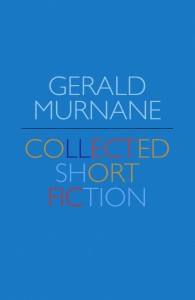 I can’t fathom why Gerald Murnane has not won the Nobel Prize for Literature (shortlisted, but not receiving the award, again in 2024). ‘Velvet Waters’ (from Murnane’s Collected Short Fiction) is a fine example of his brilliance. It is an achingly melancholy story featuring a self-contained man who tells of various situations he is in or has been in and how he has been able or unable to find his way in those situations, in the face of a kind of shyness, and fearfulness around women. He also has a clear sense at times that other people can see into his thoughts and that these thoughts are not meant to be seen by anyone else’s eyes. The grassy plains of Victoria and certain images clipped from the narrator’s life and cultural experiences are central to how the man thinks and lives. They’re also pivotal to readers understanding his ‘personality’ / the kind of man he is, and what he’s been through as he’s aged. As always with Murnane, the story is ‘about’ much more than this, layer upon layer and incidents intersecting, which makes the story intriguing to read but quite difficult to explain.
I can’t fathom why Gerald Murnane has not won the Nobel Prize for Literature (shortlisted, but not receiving the award, again in 2024). ‘Velvet Waters’ (from Murnane’s Collected Short Fiction) is a fine example of his brilliance. It is an achingly melancholy story featuring a self-contained man who tells of various situations he is in or has been in and how he has been able or unable to find his way in those situations, in the face of a kind of shyness, and fearfulness around women. He also has a clear sense at times that other people can see into his thoughts and that these thoughts are not meant to be seen by anyone else’s eyes. The grassy plains of Victoria and certain images clipped from the narrator’s life and cultural experiences are central to how the man thinks and lives. They’re also pivotal to readers understanding his ‘personality’ / the kind of man he is, and what he’s been through as he’s aged. As always with Murnane, the story is ‘about’ much more than this, layer upon layer and incidents intersecting, which makes the story intriguing to read but quite difficult to explain.
‘During the years from 1965 to 1987 the man who went to picture theatres only once in every two or three years had sometimes noticed in his mind an image from one or another film that he had watched many years earlier. If the image had been from an American film, the man had not looked at the image. The man had wanted only images from Swedish films to appear in his mind. The man had believed that images from American films would cause him to try to behave as though he had been alone with many girls and young women and women during his lifetime. The man wanted to behave as though he had sometimes walked between trees and had sometimes sat beside a stream or lake with the young woman that he had fallen in love with.’
Bonus: A friend of mine, who is also a Gerald Murnane devotee, wrote a lovely poem called ‘behind a grey felt hat’ inspired by ‘Velvet Waters’. Enjoy.

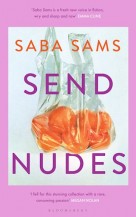


Recent Comments